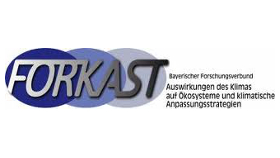FORKAST
BAVARIAN RESEARCH ASSOCIATION "CLIMATIC IMPACTS ON ECOSYSTEMS AND CLIMATIC ADAPTATION STRATEGIES"

TP1 Plasticity and Adaptive Capacity of Different Provenances of Plant Key Species in the Face of Climatic Extreme Events
As growth conditions will change significantly within the next century it is important to know how key plant species will respond to climate change, and, in particular, if they are able to cope with climatic extreme events. Intraspecific genetic differentiation (genotypes/ecotypes/provenances) might provide a chance to adapt to this changing environment. The aim of this project is to identify suitable provenances of selected key species, which are able to contribute to the conservation of persistent ecosystems with high area occupancy in Bavaria like forests and grassland. In forestry, these provenance trials have a long tradition. However, in agriculture they are hardly established. Besides, traditional experiments focus on transplant-experiments and exposition to local climate. It is now necessary to test provenances with regard to more frequent and severe extreme events. n this project we concentrate on four grassland species (Alopecurus pratensis L., Arrhenatherum elatius (L.) P.Beauv. ex J. Presl & C. Presl, Festuca pratensis Huds. and Holcus lanatus L.) and the economically and ecologically important tree species Fagus sylvatica L. . Via regional climate models (e.g. REMO) and data on recent climate conditions (e.g. WORLDCLIM) regions within the range of the target species are identified that, today, exhibit climatic conditions, which resemble the conditions expected for Northern Bavaria at the end of the 21st century. From these regions the provenances are selected for the experiment. Such a targeted selection displays a novel approach in provenance trials. he provenances of the key species are then exposed experimentally to expected future climatic conditions. The experiment includes changing means (warming) as well as extreme events (drought, late frost). With the help of the experiment we are aiming to identify provenances that are able to cope with projected future conditions. We hypothesize that southerly and easterly provenances show a higher resilience (in terms of productivity, phenology and gas exchange) against climatic extreme events and warming than more westerly and northerly provenances and than local ecotypes. Furthermore we expect that the genetic and ecological variability is smaller within local populations than between provenances within the whole range of a species.
Grant-aided by:
Bavarian State Ministry for Science, Research and Arts



